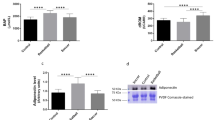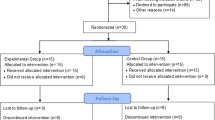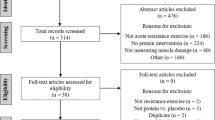Abstract
Background/Objective:
Athletes used a lot of dietary supplements to achieve the more muscle mass and improve their athletic performance. The objective of this study was to investigate the effect of l-arginine supplementation on sport performance and body composition in male soccer players.
Subjects/Methods:
This double-blinded, randomized and placebo-controlled trial was conducted on 56 male soccer players, with age range of 16–35, who referred to sport clubs in Isfahan, Iran. Subjects were randomly assigned to either l-arginine or placebo groups. Athletes received daily either 2 g per day l-arginine supplement or the same amount of placebo (maltodextrin) for 45 days. Sport performance and also body mass index (BMI), body fat mass (BFM) and lean body mass (LBM) were measured at the beginning and end of the study. Also, 3-day dietary records were collected at three different time points (before, in the middle of, and at the end of the study).
Results:
The mean age of subjects was 20.85±4.29 years. Sport performance (VO2 max) significantly increased in l-arginine supplementation group (4.12±6.07) compared with placebo group (1.23±3.36) (P=0.03). This increase remained significant even after adjustment of baseline values, physical activity and usual dietary intake of subjects throughout the study. No significant effect of l-arginine supplementation was found on weight, BMI, BFM and LBM.
Conclusions:
l-arginine supplementation (2 g per day) could increase the sport performance in male athletes, but had no effect on anthropometric measurements, including BMI, BFM and LBM. So, further studies are needed to shed light our findings.
This is a preview of subscription content, access via your institution
Access options
Subscribe to this journal
Receive 12 print issues and online access
$259.00 per year
only $21.58 per issue
Buy this article
- Purchase on Springer Link
- Instant access to full article PDF
Prices may be subject to local taxes which are calculated during checkout

Similar content being viewed by others
References
Gahche J, Bailey R, Burt V, Hughes J, Yetley E, Dwyer J et al. Dietary supplement use among U.S. adults has increased since NHANES III (1988-1994). NCHS Data Brief 2011; 61: 1–8.
Nissen SL, Sharp RL . Effect of dietary supplements on lean mass and strength gains with resistance exercise: a meta-analysis. J Appl Physiol 2003; 94: 651–659.
Antonio J, Sanders MS, Ehler LA, Uelmen J, Raether JB, Stout JR . Effects of exercise training and amino-acid supplementation on body composition and physical performance in untrained women. Nutrition 2000; 16: 1043–1046.
Wu G, Morris SM Jr . Arginine metabolism: nitric oxide and beyond. Biochem J 1998; 336: 1–17.
Reyes AA, Karl IE, Klahr S . Role of arginine in health and in renal disease. Am J Physiol 1994; 267: 331–346.
Lucotti P, Monti L, Setola E, La Canna G, Castiglioni A, Rossodivita A et al. Oral L-arginine supplementation improves endothelial function and ameliorates insulin sensitivity and inflammation in cardiopathic nondiabetic patients after an aortocoronary bypass. Metabolism 2009; 58: 1270–1276.
Lucotti P, Setola E, Monti LD, Galluccio E, Costa S, Sandoli EP et al. Beneficial effects of a long-term oral L-arginine treatment added to a hypocaloric diet and exercise training program in obese, insulin-resistant type 2 diabetic patients. Am J Physiol Endocrinol Metab 2006; 291: 906–912.
Sadeghi O, Askari G, Maghsoudi Z, Nasiri M, Khorvash F . Migraine and risk of stroke: review of current evidence. Jundishapur J Chronic Dis Care 2014; 3: e21707.
Pahlavani N, Jafari M, Rezaei M, Rasad H, Sadeghi O, Rahdar HA et al. L-arginine supplementation and risk factors of cardiovascular diseases in healthy men: a double-blind randomized clinical trial. Eur J Nutr 2010; 49: 483–492.
Sadeghi O, Maghsoudi Z, Askari G, Khorvash F, Feizi A, Ghiasvand R . Association between serum levels of homocysteine with characteristics of migraine attacks in migraine with aura. J Res Med Sci 2014; 19: 1041–1045.
Settergren M, Bohm F, Malmstrom RE, Channon KM, Pernow J . L-arginine and tetrahydrobiopterin protects against ischemia/reperfusion-induced endothelial dysfunction in patients with type 2 diabetes mellitus and coronary artery disease. Atherosclerosis 2009; 204: 73–78.
Wascher TC, Graier WF, Dittrich P, Hussain MA, Bahadori B, Wallner S et al. Effects of low-dose L-arginine on insulin-mediated vasodilatation and insulin sensitivity. Eur J Clin Invest 1997; 27: 690–695.
Martina V, Masha A, Gigliardi VR, Brocato L, Manzato E, Berchio A et al. Long-term N-acetylcysteine and L-arginine administration reduces endothelial activation and systolic blood pressure in hypertensive patients with type 2 diabetes. Diabetes care 2008; 31: 940–944.
Santos R, Pacheco M, Martins R, Villaverde A, Giana H, Baptista F . Study of the effect of oral administration of L-arginine on muscular performance in healthy volunteers: an isokinetic study. Isokinet Exerc Sci 2002; 10: 153–158.
Liu TH, Wu CL, Chiang CW, Lo YW, Tseng HF, Chang CK . No effect of short-term arginine supplementation on nitric oxide production, metabolism and performance in intermittent exercise in athletes. J Nutr Biochem 2009; 20: 462–468.
Elam RP, Hardin DH, Sutton RA, Hagen L . Effects of arginine and ornithine on strength, lean body mass and urinary hydroxyproline in adult males. J Sports Med Phys Fitness 1989; 29: 52–56.
Thompson PD, Arena R, Riebe D, Pescatello LS . American College of Sports Medicine. ACSM's new preparticipation health screening recommendations from ACSM's guidelines for exercise testing and prescription, ninth edition. Curr Sports Med Rep 2013; 12: 215–217.
Taghiyar M, Ghiasvand R, Askari G, Feizi A, Hariri M, Mashhadi NS et al. The Effect of vitamins C and E supplementation on muscle damage, performance, and body composition in athlete women: a clinical trial. Int J Prev Med 2013; 4 (Suppl 1), S24–S30.
Banerjee PK, Chatterjee S . Harvard step test as a measure of physical fitness in adolescent boys. Indian J Med Res 1984; 79: 413–417.
Vasheghani-Farahani A, Tahmasbi M, Asheri H, Ashraf H, Nedjat S, Kordi R . The Persian, last 7-day, long form of the International Physical Activity Questionnaire: translation and validation study. Asian J Sports Med 2011; 2: 106–116.
Ghaffarpour M, Houshiar-Rad A, Kianfar H . The manual for household measures, cooking yields factors and edible portion of foods. Keshaverzi Press: Tehran, Iran, 1999; 1–46. (Farsi).
Zatollah Asemi, Esmaillzadeh A . Effects of vitamin D supplementation on glucose metabolism, lipid concentrations, inflammation, and oxidative stress in gestational diabetes: a double-blind randomized controlled clinical trial. Am J Clin Nutr 2013; 98: 1425–1432.
Mohammadifard N, Sajjadi F, Maghroun M, Alikhasi H, Nilforoushzadeh F, Sarrafzadegan N . Validation of a simplified food frequency questionnaire for the assessment of dietary habits in Iranian adults: Isfahan Healthy Heart Program, Iran. ARYA Atheroscler 2015; 11: 139–146.
Stevens BR, Godfrey MD, Kaminski TW, Braith RW . High-intensity dynamic human muscle performance enhanced by a metabolic intervention. Med Sci Sports Exerc 2000; 32: 2102–2108.
Colombani PC, Bitzi R, Frey-Rindova P, Frey W, Arnold M, Langhans W et al. Chronic arginine aspartate supplementation in runners reduces total plasma amino acid level at rest and during a marathon run. Eur J Nutr 1999; 38: 263–270.
Position of the American Dietetic Association and the Canadian Dietetic Association: nutrition for physical fitness and athletic performance for adults. J Am Diet Assoc 1993; 93: 691–696.
Piatti PM, Monti LD, Valsecchi G, Magni F, Setola E, Marchesi F et al. Long-term oral L-arginine administration improves peripheral and hepatic insulin sensitivity in type 2 diabetic patients. Diabetes Care 2001; 24: 875–880.
Flakoll P, Sharp R, Baier S, Levenhagen D, Carr C, Nissen S . Effect of β-hydroxy-β-methylbutyrate, arginine, and lysine supplementation on strength, functionality, body composition, and protein metabolism in elderly women. Nutrition 2004; 20: 445–451.
White MF . The transport of cationic amino acids across the plasma membrane of mammalian cells. Biochim Biophys Acta 1985; 822: 355–374.
Alvares TS, Meirelles CM, Bhambhani YN, Paschoalin VM, Gomes PS . L-Arginine as a potential ergogenic aid in healthy subjects. Sports Med 2011; 41: 233–248.
Mendes-Ribeiro AC, Mann GE, de Meirelles LR, Moss MB, Matsuura C, Brunini TM . The role of exercise on L-arginine nitric oxide pathway in chronic heart failure. Open Biochem J 2009; 3: 55–65.
Little JP, Forbes SC, Candow DG, Cornish SM, Chilibeck PD . Creatine, arginine alpha-ketoglutarate, amino acids, and medium-chain triglycerides and endurance and performance. Int J Sport Nutr Exerc Metab 2008; 18: 493–508.
Acknowledgements
This paper was adapted from MSc dissertation, which was supported by School of Nutrition & Food Sciences, Isfahan University of Medical Sciences (code: 392435). So, we thank the authorities of this university for their cooperation. Also, we appreciate the athletes who participated in the study.
Author information
Authors and Affiliations
Corresponding author
Ethics declarations
Competing interests
The authors declare no conflict of interest.
Rights and permissions
About this article
Cite this article
Pahlavani, N., Entezari, M., Nasiri, M. et al. The effect of l-arginine supplementation on body composition and performance in male athletes: a double-blinded randomized clinical trial. Eur J Clin Nutr 71, 544–548 (2017). https://doi.org/10.1038/ejcn.2016.266
Received:
Revised:
Accepted:
Published:
Issue Date:
DOI: https://doi.org/10.1038/ejcn.2016.266
This article is cited by
-
Dysregulation of acyl carnitines, pentose phosphate pathway and arginine and ornithine metabolism are associated with decline in intrinsic capacity in Chinese older adults
Aging Clinical and Experimental Research (2024)
-
L-arginine and lisinopril supplementation protects against sodium fluoride–induced nephrotoxicity and hypertension by suppressing mineralocorticoid receptor and angiotensin-converting enzyme 3 activity
Environmental Science and Pollution Research (2022)
-
How to Increase Muscle Mass in Critically Ill Patients: Lessons Learned from Athletes and Bodybuilders
Current Nutrition Reports (2020)
-
Supplements with purported effects on muscle mass and strength
European Journal of Nutrition (2019)
-
Safety of dietary supplementation with arginine in adult humans
Amino Acids (2018)



